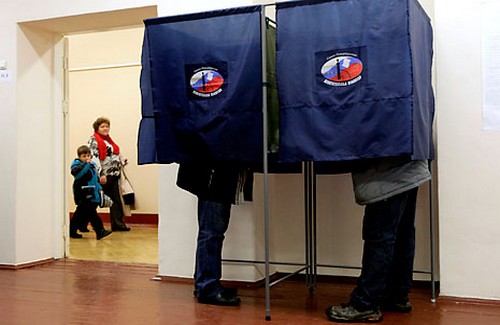Real democracies can roll with the punches
20:42 - 11 March 2012

THIS weekend offered a rogues’ gallery of phoney democracy in action. In Russia, it was announced that Vladimir Putin had been swept back to the Kremlin, after a suspiciously smashing first-round victory in the presidential election. Iran staged its first parliamentary elections since the rigged presidential poll of 2009 and the violent suppression of the Green movement. And in China, the National People’s Congress — the country’s rubber-stamp parliament — assembled for its annual meeting.
It is a coincidence — but perhaps no accident — that these are the three nations that have emerged as the closest protectors of Syria’s murderous one-party state. The spectacle should give pause to those who like to believe an irresistible wave of democracy is sweeping the globe. But events in Russia, Iran and China should also give a perverse form of encouragement to democrats. For even as they decry the flaws and hypocrisies of western democracies, the world’s autocrats feel compelled to ape their practices.
The Russians insist with a straight face they have done everything in their power to prevent ballot-rigging. The Iranians trumpet the size of the turnout in their poll. Even in China, where the authorities would not dare to risk a national election, the opening speeches to the National People’s Congress made frequent references to the \"democratic\" nature of Chinese politics.
The authoritarian urge to cross-dress in democratic clothes is an implied compliment to the democratic nations. That matters, because western democracies are going through a crisis of confidence that is being closely watched.
I am now in China and have been surprised by the degree of interest in the political and economic crisis in Europe. One liberal academic, a strong proponent of democratic reform in China, told me she was now often confronted by the view that Europe’s crisis demonstrates the inherent flaws of democracy. The argument is that Europe’s politicians have bought power by bribing voters with unsustainable welfare benefits. Now, faced with the resulting economic crisis, they are unable to make the necessary reforms. What, I was asked, was the best answer to this critique, for somebody trying to argue for democracy in China? I struggled to frame a coherent response. For there is some truth in the idea that democracy tempts politicians to make unaffordable promises — and dissuades them from attempting difficult reforms.
Democracy has its flaws: populism, the excessive power of lobbyists, the urge to make unaffordable promises and to shirk reforms. But as the Egyptian and Tunisian revolutions reminded us all, authoritarianism tends to produce its own morbid and dysfunctional symptoms: corruption, injustice, police abuse, torture, denial of freedom of speech. Nor were the Arab societies that rose up in revolt exactly adverts for the superiority of authoritarian economic management.
The \"Arab S pring\" has shocked the pillars of global authoritarianism.
The Iranians, as near neighbours, have good reason to fear a revival of their own protest movement. Putin’s victory has been tainted by the protests and mockery he has endured since December, as Moscow demonstrators took to the streets.
Even the Chinese government, fortified by an economic boom, is palpably nervous. The harassment of dissidents has increased since the \"Arab Spring\". A surprising number of Chinese and foreign observers in Beijing believe that, as one analyst put it, \"this place could blow at any moment\".
The sources of potential Chinese instability are many and various. They include anger at corruption, land disputes, economic imbalances and environmental problems. But the root problem is that, without a democratic system, China does not have a safe outlet for dissent.
When ordinary citizens occupied Tahrir Square, it was the beginning of the end for the Mubarak regime in Egypt. Similar demonstrations in Beijing would be immensely threatening to Communist Party rule, which is why incipient protests were swiftly crushed last year. By contrast, when protesters occupied Wall Street, they got a lot of attention — but only the most overheated of them believed the US system of government was seriously under threat. Democracy can roll with the punches, but authoritarian systems have a glass jaw.
Even in Greece, demonstrators are arguing for new policies and politicians — not to abandon the democratic system. By contrast, all China’s economic success cannot change the perception that the current political system will have to change. China’s ability to get things done has excited interest and envy, but it is hard to think of any nation where there is popular demand to adopt China’s political system.
No matter how debt-ridden and dysfunctional they look, the world’s democracies are still winning the global beauty contest.
BY: GIDEON RACHMAN
Source - BusinessDay
It is a coincidence — but perhaps no accident — that these are the three nations that have emerged as the closest protectors of Syria’s murderous one-party state. The spectacle should give pause to those who like to believe an irresistible wave of democracy is sweeping the globe. But events in Russia, Iran and China should also give a perverse form of encouragement to democrats. For even as they decry the flaws and hypocrisies of western democracies, the world’s autocrats feel compelled to ape their practices.
The Russians insist with a straight face they have done everything in their power to prevent ballot-rigging. The Iranians trumpet the size of the turnout in their poll. Even in China, where the authorities would not dare to risk a national election, the opening speeches to the National People’s Congress made frequent references to the \"democratic\" nature of Chinese politics.
The authoritarian urge to cross-dress in democratic clothes is an implied compliment to the democratic nations. That matters, because western democracies are going through a crisis of confidence that is being closely watched.
I am now in China and have been surprised by the degree of interest in the political and economic crisis in Europe. One liberal academic, a strong proponent of democratic reform in China, told me she was now often confronted by the view that Europe’s crisis demonstrates the inherent flaws of democracy. The argument is that Europe’s politicians have bought power by bribing voters with unsustainable welfare benefits. Now, faced with the resulting economic crisis, they are unable to make the necessary reforms. What, I was asked, was the best answer to this critique, for somebody trying to argue for democracy in China? I struggled to frame a coherent response. For there is some truth in the idea that democracy tempts politicians to make unaffordable promises — and dissuades them from attempting difficult reforms.
Democracy has its flaws: populism, the excessive power of lobbyists, the urge to make unaffordable promises and to shirk reforms. But as the Egyptian and Tunisian revolutions reminded us all, authoritarianism tends to produce its own morbid and dysfunctional symptoms: corruption, injustice, police abuse, torture, denial of freedom of speech. Nor were the Arab societies that rose up in revolt exactly adverts for the superiority of authoritarian economic management.
The \"Arab S pring\" has shocked the pillars of global authoritarianism.
The Iranians, as near neighbours, have good reason to fear a revival of their own protest movement. Putin’s victory has been tainted by the protests and mockery he has endured since December, as Moscow demonstrators took to the streets.
Even the Chinese government, fortified by an economic boom, is palpably nervous. The harassment of dissidents has increased since the \"Arab Spring\". A surprising number of Chinese and foreign observers in Beijing believe that, as one analyst put it, \"this place could blow at any moment\".
The sources of potential Chinese instability are many and various. They include anger at corruption, land disputes, economic imbalances and environmental problems. But the root problem is that, without a democratic system, China does not have a safe outlet for dissent.
When ordinary citizens occupied Tahrir Square, it was the beginning of the end for the Mubarak regime in Egypt. Similar demonstrations in Beijing would be immensely threatening to Communist Party rule, which is why incipient protests were swiftly crushed last year. By contrast, when protesters occupied Wall Street, they got a lot of attention — but only the most overheated of them believed the US system of government was seriously under threat. Democracy can roll with the punches, but authoritarian systems have a glass jaw.
Even in Greece, demonstrators are arguing for new policies and politicians — not to abandon the democratic system. By contrast, all China’s economic success cannot change the perception that the current political system will have to change. China’s ability to get things done has excited interest and envy, but it is hard to think of any nation where there is popular demand to adopt China’s political system.
No matter how debt-ridden and dysfunctional they look, the world’s democracies are still winning the global beauty contest.
BY: GIDEON RACHMAN
Source - BusinessDay



